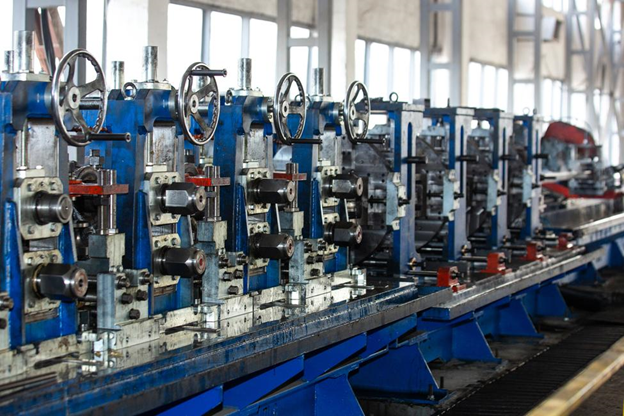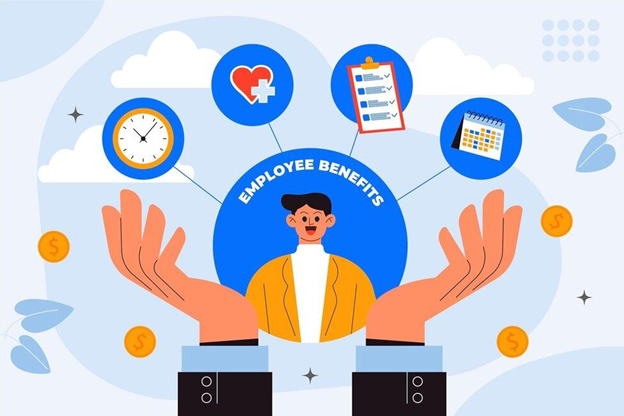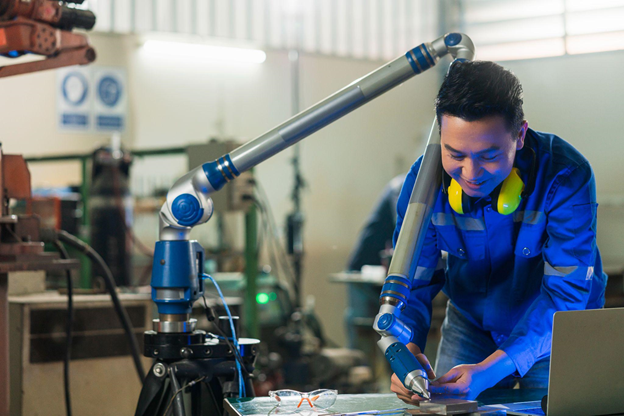Working environment in Vietnamese factories and key points for securing human resources
Vietnam's Factory Environment: A Key Factor in Workforce Retention
What makes employees stay long-term in industrial jobs? One often overlooked answer lies in Vietnam factory environment, a crucial factor shaping workforce retention today. With growing global interest in Vietnam's manufacturing sector, factory conditions are under more scrutiny than ever. Each element plays a part in retaining skilled workers, from stress levels and safety protocols to corporate culture and compensation packages. This article explores the current challenges, influencing factors, and solutions that are redefining Vietnam factory environment.
Current Working Conditions in Vietnamese Factories

Current working conditions in Vietnamese factories (Source)
The Vietnam Factory sector has expanded rapidly, drawing attention to the working conditions within its factories. While this growth has created numerous job opportunities, it has also highlighted challenges related to employee well-being and labor standards.
Stress and Psychological Factors Affecting Workers
Workers in Vietnam's industrial sector frequently deal with considerable psychological stress. Studies indicate that the prevalence of occupational stress among factory workers ranges from 20.7% to 89.6%, influenced by factors such as long working hours, high job demands, and limited control over work tasks.
Additionally, research has shown that depressive symptoms are a notable concern among industrial workers, stemming from work-related factors and contributing to serious burdens for both employees and employers.
These mental health challenges are compounded by the lack of adequate support systems within many factories, leading to decreased productivity and increased turnover rates.
Employment Conditions
Employment conditions in Vietnamese factories vary, but common issues include low wages, extended working hours, and limited access to benefits. Many workers are employed informally, receiving few health and social benefits, which affects their ability to afford treatment for illnesses or injuries.
Furthermore, some factories maintain a culture of secrecy, discouraging employees from speaking about their working conditions under threat of unemployment.
Factors Influencing the Working Environment in Factories
The working environment in Vietnamese factories is shaped by various factors that directly impact employee well-being and productivity. Understanding these elements is crucial for fostering a conducive workplace.
Facilities and Equipment

Facilities & equipment (Source)
Modern facilities and advanced equipment are essential for efficient operations and employee well-being. Factories equipped with state-of-the-art machinery not only boost productivity but also enhance worker safety. For instance, Lego's new factory in Binh Duong employs advanced automation and robotics, aiming to run entirely on clean energy by 2026. Such investments in infrastructure reflect a commitment to sustainable and employee-friendly manufacturing environments.
Moreover, the integration of modern management systems and skilled labor in Vietnamese factories contributes to improved product quality and operational efficiency. These advancements make factories more attractive to both domestic and international investors, further enhancing the working environment.
Occupational Safety Policies

Occupational safety policies (Source)
Occupational safety is a critical component of the working environment. Vietnam's Labor Code of 2019 outlines comprehensive safety standards, emphasizing the responsibilities of employers to maintain a safe workplace. It is mandatory for employers to evaluate potential risks and take action to reduce them, safeguarding worker health and safety.
The Law on Occupational Safety and Health (Law No. 84/2015/QH13) also provides guidelines for preventing occupational accidents and diseases. Compliance with these regulations protects employees and enhances the overall productivity and reputation of manufacturing enterprises.
Corporate Culture

Corporate culture (Source)
Corporate culture significantly influences employee morale and retention. A positive work culture fosters collaboration, respect, and a sense of belonging among employees. In Vietnam, companies that prioritize employee well-being and open communication tend to experience higher levels of job satisfaction and lower turnover rates.
Furthermore, organizations that invest in employee development and recognize individual contributions create an environment where workers feel valued and motivated. Such cultures not only improve employee engagement but also contribute to the company's long-term success.
Key Elements for Workforce Protection
A sustainable workforce in Vietnam's manufacturing sector hinges on several critical factors. These elements ensure compliance with labor laws and foster an environment conducive to employee well-being and productivity.
Compensation and Benefits

Compensation & Benefits (Source)
Offering competitive compensation and comprehensive benefits is fundamental to attracting and retaining talent. In Vietnam, the minimum monthly wage varies by region, with areas like Hanoi and Ho Chi Minh City offering higher salaries to match the cost of living.
Employers often provide additional benefits, including annual leave, public holidays, sick leave, and maternity leave, as mandated by law. For instance, employees are entitled to 12 paid annual leave days, 12 public holidays, up to 30 days of sick leave with social security pay, and 24 weeks of paid maternity leave.
Beyond statutory requirements, many companies offer performance-based bonuses, year-end incentives, and support for work permits for foreign employees. These additional benefits enhance job satisfaction and demonstrate a company's commitment to its workforce.
Career Advancement and Training Opportunities

Career advancement & training opportunities (Source)
Vietnam's manufacturing sector faces a challenge with a significant portion of its workforce lacking formal training. Reports indicate that only 28% of workers possess formal qualifications, which limits their career advancement prospects.
To address this, many companies are investing in vocational training programs to upskill their employees. For example, the Asian Development Bank has highlighted efforts to improve technical and vocational education and training (TVET) systems in Vietnam to enhance the employability of workers.
Additionally, companies that offer clear career progression paths and internal promotions tend to experience lower turnover rates and higher employee morale. Such initiatives not only benefit the workers but also contribute to the overall success and competitiveness of the company.
Work-Life Balance Policies

Work-life balance policies (Source)
Work-life balance is a critical aspect of workforce protection. Vietnamese labor law mandates a maximum of 8 working hours per day and 40 hours per week under normal conditions, with provisions for reduced hours in hazardous environments.
However, in practice, many factory workers exceed these limits due to mandatory overtime, which can lead to fatigue and decreased productivity. Some companies offer additional annual leave beyond the statutory 12 days, with some providing up to 20 days, depending on seniority and company policy.
Implementing effective work-life balance policies requires a commitment from employers to prioritize employee well-being and adhere to labor regulations.
Improving the Factory Work Environment

Enhance the factory work environment (Source)
Enhancing the factory work environment is essential for attracting and retaining skilled workers. This involves upgrading physical infrastructure and fostering a culture of safety and respect.
For example, the Fair Labor Association's report on Vietnam highlights that workers who earn a living wage do so primarily through excessive overtime, which may compromise their health and safety. Addressing this issue requires employers to ensure that wages are sufficient without relying on overtime, thereby promoting a healthier work environment.
Additionally, implementing comprehensive occupational safety policies is crucial. Factories should conduct regular risk assessments, provide necessary protective equipment, and offer training on safety protocols. Such measures comply with legal requirements and demonstrate a commitment to employee health and well-being.
Furthermore, fostering a positive corporate culture that values open communication, respect, and inclusivity can significantly impact employee morale and retention. Workers who feel valued and heard are more likely to remain with the company and contribute to its success.
Kizuna's Factory Ecosystem and HR Support Services for Workforce Stability

Kizuna offers a comprehensive solution (Source)
Kizuna, a pioneer in serviced factory solutions in Vietnam, offers a comprehensive ecosystem designed to support businesses throughout their operational journey. This ecosystem encompasses optimal factory designs, strategic locations, and supporting services, particularly on human resource (HR) support. These services are crucial for fostering workforce stability and enhancing operational efficiency.
Comprehensive HR Support Services
Kizuna's HR support services are tailored to assist enterprises in effectively managing their human resources, especially during the initial operation phases. The services include:
- Initial HR Operation Consulting: For the first six months of operation, Kizuna provides guidance on managing employee profiles, preparing employment contracts, and handling social and health insurance procedures.
- Recruitment Consulting: Assistance in developing organizational structures and job descriptions, along with support in recruitment processes to ensure the acquisition of suitable talent.
- Labor Union Establishment Guidance: Support establishing labor unions, ensuring compliance with legal requirements, and fostering a collaborative work environment.
- Work Permit and Temporary Residence Card Services: Facilitation of work permit applications and extensions for foreign employees, as well as assistance in obtaining temporary residence cards.
- Daily HR Operations Management: Provision of daily HR operations management services, including payroll processing, social insurance, health insurance, unemployment insurance, and personal income tax calculations for up to 10 employees.
These services are designed to allow businesses to focus on core operations while ensuring compliance with Vietnamese labor laws and regulations.
Enhancing Workforce Stability
Kizuna creates an environment that promotes workforce stability by integrating these HR support services. The seamless management of HR functions leads to improved employee satisfaction and retention. Additionally, efficient HR management eases administrative workload, helping businesses use their resources more wisely.
Kizuna's commitment to providing a comprehensive factory ecosystem, with a strong focus on HR support, is pivotal in enhancing workforce stability. This approach not only supports the operational needs of businesses but also contributes to the sustainable development of the manufacturing sector in Vietnam.